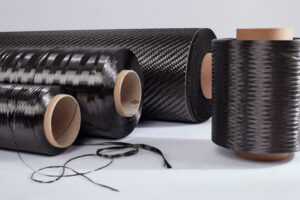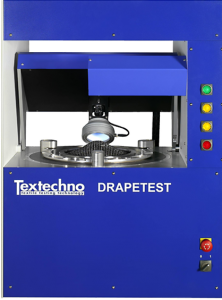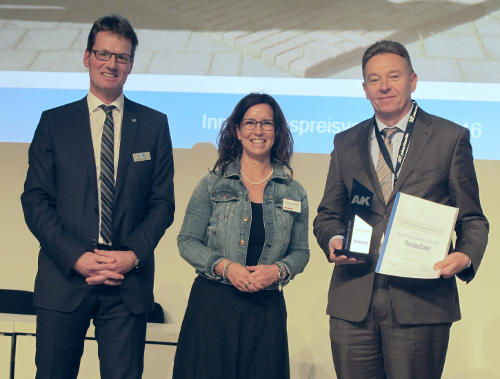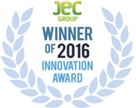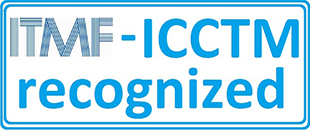News
Textechno is now part of the umati community
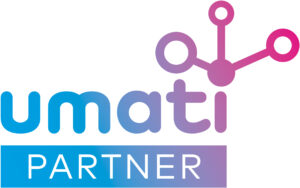 What is umati?
What is umati?
umati (universal machine technology interface) is a community of the machine building industries and their customers for the promotion and adoption of open, standardized interfaces based on OPC UA.
… and what is OPC-UA?
OPC UA (Open Platform Communications Unified Architecture) is a standardized communication protocol for industrial automation and the Internet of Things (IoT) applications. It enables secure and reliable data exchange between machines, systems, and enterprise applications. The communication through OPC US works regardless of the hardware, software, or operating system used.
What expectations does Textechno have of umati and the partnership?
With the partnership Textechno underlines the need for open, feature-rich, and certified communication standards for tight integration between production machines, testing instruments and control systems. A strong partnership will help explore the potential and shape the future of integration using OPC-UA.
What advantages does umati offer Textechno and its customers?
Umati allows us to showcase integration and integrity of our instruments in a diverse production environment. Our customers are assured of a flawless integration of our devices. At the same time, the potential of in-depth interconnectivity is highlighted.
How does Textechno evaluate the expansion of the umati initiative to the entire mechanical engineering industry?
Textechno is frequently asked by its customers to interface with their proprietary production control and execution systems. For us it is important that the OPC-UA standard is promoted across the industry and that a common understanding is formed among those who implement OPC-UA for instance by making broad use of companion specifications.
New ISO 5688 for crimp contraction
Up to now, TEXTURMAT users had to refer to the German standard DIN 53840, describing textured yarn properties as Crimp Contraction, Crimp Modulus and Crimp Stability. Alternatively, the EN 14621 was used, however, describing the Crimp Contraction only. Unfortunately, there was no standard defining CM and CS on international Level.
Finally, the new ISO 5688 – with identical definitions of CC, CM and CS as in the DIN 53840 – is published, so that TEXTURMAT users can finally put an ISO stamp on their test reports.
In combination with the existing ISO 18066 and ISO 18067 for filament yarn boiling water and hot air shrinkage, the TEXTURMAT is entirely in accordance with ISO standards.
Textechno Enhances its Composite Testing Technology with ITA Reinforced Partnership
Textechno is pleased to announce its ITA Reinforced Partnership. Textechno will be working in close collaboration in the ITA Reinforced partnership to drive innovation in composite testing and to further advance excellence in lightweight production.
Dr. Ulrich Mörschel, Textechno’s managing director: “The precise knowledge of key material parameters is the fundamental basis of the production of high-quality composite products. With its innovative composite testing instruments Textechno supports its customers to be more successful. Our ITA Reinforced partnership will further help us to contribute to the advances of the composite industry.”
Dr. Stefan Fliescher, Textechno’s assistant managing director:” Textechno’s strategic decision to apply our knowledge of textile testing technologies to the benefit of composite materials has by now led to the development of four dedicated testing instruments. These are applied by customers worldwide to strengthen their lightweight production and R&D. With FAVIMAT+ the most relevant characteristics of reinforcement fibres are tested, FIMATEST reveals the fibre/matrix adhesion, the drapeability of fabrics and NCFs is probed with DRAPETEST and ROVINGTEST measures the processing properties of rovings and yarns. We are looking forward to a close collaboration with ITA Reinforced to contribute to joint development and expert knowledge.”
Standardization of the Single-Fibre Pull-Out Test
Fast and effective micromechanical testing of the interfacial shear strength is the focus of the novel DIN SPEC 19289. Published in August 2022, this pre-standard or ‘technical rule’ specifies how to characterize the bonding between fibre and matrix by means of a single-fibre pull-out test.
The technique is well suited for the needs of the composite industry and the specification was developed in the scope of a publicly funded research project between the partners Fraunhofer IGCV, Faserinstitut Bremen e.V. (FIBRE) and Textechno. The method described in DIN SPEC 19289 is implemented in Textechno’s FIMATEST system.
Up to now a characterization of the interfacial shear strength according to standards was only possible with elaborate and hence expensive macromechanical testing techniques such as interlaminary shear strength testing (ILSS). Whereas the results of macromechancial tests tend to depend on the exact mechanical structure of the test specimen, the single-fibre pull-out test gives a direct measure of the fibre-matrix adhesion strength on its own.
Textechno developes new Test System - TAPETEST
During manufacturing of composites using tape laying processes the quality of the tape is essential. Variations in the tape affect both – the robustness of the manufacturing process as well as the quality of the final product. Thus, quality control of tapes and improvement of final composite performance are imminent.
With TAPETEST for the first time a commercial test system is available, that characterizes tapes in detail in multiple aspects.
International standardization of the DRAPETEST method as ISO 21765
Textechno proudly announces that the test method implemented in the automatic drapability tester DRAPETEST is now standardized on international level as ISO 21765.
This new standard “Textiles – Determination of fabric deformability by forced mechanical distension” results from a continuous development of the DIN SPEC 8100. The focus of this standard is on the formation of defects during the draping and forming process of standard- and non-crimp fabrics.
The test method of the new ISO 21765 allows for the first time an exchange of comparable and reproducible quality data for the drapability between customers and suppliers of standard- and non-crimp fabrics worldwide.
In addition to the classical application for reinforcement fabrics, the new standard also applies to fabrics used e.g. in furniture, automotive, filters, medical textiles and further applications.
70 Years of Textechno
On April 14, 1949, the “engineering company Herbert Stein” was registered as a business enterprise at the regulatory authority of the city Mönchengladbach. The change of name to “Textechno Herbert Stein” took place a few years later.
From its very beginning, Textechno, since 2004 in conjunction with its subsidiary Lenzing Instruments in Austria, has developed into one of the leading international suppliers of textile measuring and testing technology for the man-made fiber, cotton and composites industry.
Even today, 70 years after its founding by Mr. Herbert Stein, the Textechno Group is a pure family business without external investors.
World leading interface expert Michelman counts on Textechno's FIMATEST for cost-efficient and customized sizing development for composite materials
Michelman, a global developer and manufacturer of environmentally friendly advanced materials, including sizing for glass and carbon fiber, has invested in the FIMATEST adhesion measurement system to ensure their sizing solutions continue to contribute to enhanced performance of composite parts.
“As we continue our vision to be the interface expert, it is critical to have analytical equipment that can efficiently fine-tune our sizing to optimize adhesion properties. This is one of the key performance attributes we provide our customers, and the fact that the Textechno FIMATEST system works according to the fiber pull-out principle makes it extremely valuable”, explains Steve Bassetti, Michelman’s Global Marketing Director for Industrial Manufacturing. “We have utilized this equipment in our development lab for almost two years, and it is suited for any fiber-matrix combination we have developed. It has been helpful that Textechno developed these instruments because they are, and will continue to be, a great benefit to the entire Composites industry. We look forward to supporting Textechno in establishing more standardization for the Industry regarding fiber-matrix-adhesion and processing properties.“
Dr. Ulrich Mörschel, CEO of Textechno, added: “We are proud that Michelman, the industry’s leading interface expert, invested in our testing system.” Bassetti further elaborated on the system’s benefits: “For Michelman’s customers, this equipment has allowed for great collaboration, increased screening of sizing concepts, and a more robust and efficient product development process.”
Dr. Michael Effing, Senior Advisor to Textechno and one of its relationship managers: “I am happy to support the matchmaking between these two organizations because the market for high-end structural composite applications in the aerospace, automotive and wind energy sectors is growing at a rate of 6 to 8% year over year, representing over $125B globally. 90% of the market value is glass fiber-based, and 10% is carbon fiber-based. Therefore, reliable testing systems measuring the quality of fibers, fabrics, and the quality of the fiber-matrix adhesion are of tremendous importance to the industry. “
Textechno has enhanced its Composite Testing Technology with AZL Partnership
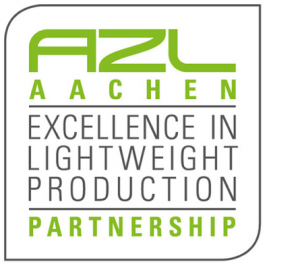 Textechno has worked with the Aachen Center for integrative Lightweight Production (AZL) to drive innovation in composite testing and to further advance excellence in lightweight production.
Textechno has worked with the Aachen Center for integrative Lightweight Production (AZL) to drive innovation in composite testing and to further advance excellence in lightweight production.
About the Aachen Center for Integrative Lightweight Production (AZL) of RWTH Aachen University and AZL Aachen GmbH
The Aachen Center for Integrative Lightweight Production (AZL) of RWTH Aachen University is specialized in research and development of lightweight products, materials, production processes and systems focusing on integrated and combined process chains and multi-material systems.
As a service provider partnering with companies in the field of lightweight production technology, AZL Aachen GmbH provides industrial services in the areas of engineering, consultancy and project management, networking and business development. With the AZL Partnership, AZL Aachen GmbH together with the AZL of RWTH enables the close cooperation between the lightweight industry and nine research institutes of RWTH Aachen Campus along the whole value chain. The AZL Partner Network consists of more than 80 industrial partners from 21 countries representing the entire lightweight production value chain.
New Precision Test Equipment to Measure Properties of Rovings
Textechno has launched its latest equipment ROVINGTEST at JEC 2017 in Paris. ROVINGTEST measures the most important properties of rovings all at once.
FIMATEST – Quality Assessment of Composites
JEC Composites Magazine No. 102, 2016, 49-51
The glass and carbon fibre industry continues to grow rapidly and into many new applications. A key quality characteristic of composite materials is the bond strength between fibre and matrix. This article describes the different mechanisms, as well as future testing solutions to ensure that a constant quality can be measured and achieved.
Textechno wins Special Award of AVK as Attractive Employer 2016
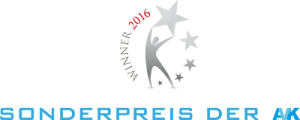 Textechno has won the special prize of the AVK as “Attractive Employer 2016” in the field of reinforced plastics. The award ceremony was held on November 28th during the 2nd International Composites Congress (ICC) at the Composites Europe exhibition. The AVK is the oldest interest group representing the plastics industry in Germany and has about 250 active members in industry and research.
Textechno has won the special prize of the AVK as “Attractive Employer 2016” in the field of reinforced plastics. The award ceremony was held on November 28th during the 2nd International Composites Congress (ICC) at the Composites Europe exhibition. The AVK is the oldest interest group representing the plastics industry in Germany and has about 250 active members in industry and research.
In addition, the prize was announced to the full Textechno team by the chairman of AVK, Dr. Michael Effing. “There is only a very small fluctuation among the employees. Many are with Textechno for more than 25 years. The staff members have a strong relationship to the company and there is a personal working atmosphere. The working hours are family friendly. In the last two years, Textechno was also awarded by IHK as “Best Apprenticing Company”. All this played an important role in our decision.”, Dr. Effing explained the decision of the jury.
Textechno establishes New Department for Composite Testing Services
Textechno establishes a new department for composite testing services. Besides testing basic fibre properties with FAVIMAT+, customers can also examine the fibre/matrix adhesion with the new FIMATEST system and the drapability of woven and non-crimp fabrics for composites with DRAPETEST. Through our services you gain easy access to award winning testing technology. Read more in our press release and our flyer on Textechno’s testing services.
Textechno receives the DIN Innovation Award

Textechno receives the DIN innovation award for DIN SPEC 8100 and its test equipment DRAPETEST serving the purpose of evaluating composite woven and non-crimp fabrics. The award ceremony took place at Hannover Messe in Germany on April 26th, 2016 in the framework of the DIN forum “standards for the world of tomorrow”.
The DIN SPEC 8100 “Automated drapability testing for woven and non-crimp fabrics used in continuous fiber reinforced plastics” was developped and implemented by Textechno in cooperation with DIN, as well as SAERTEX, the Bremen Fibre Institute (FIBRE), Groz-Beckert KG and FTA Albstadt.
The right fabric material for the appropriate composite
In the automated production of carbon- or glass fiber-based woven and non-crimp fabrics for the aerospace or automotive industry, a major problem consists in undetected errors as they occur during the three-dimensional deformation for the final component (draping). The method described in the DIN SPEC uses i.a. a high-resolution camera in conjunction with an image analysis, detecting imperfections while draping. This method provides values with which the properties of the textile fabric can be characterized and it ultimately helps selecting the right fabric material for the appropriate composite.
Dr. Ulrich Mörschel, CEO of Textechno explains: “With our products, we contribute to avoid conflicts between suppliers and end-users wherever possible. The development of the DIN SPEC has procured us a fast possibility to set a new and useful standard for the entire composite industry, where there are not yet many standards set.“
Dietmar Möcke, Technical Director at SAERTEX, a globally leading manufacturer of woven and non-crimp fabrics and co-initiator of DIN SPEC says: „DIN SPEC offers for the first time a standardized testing method. It allows us to provide our customers with comparable and reproducible measurement values regarding the draping characteristics of our products. Thus they get a standardized overview of the textile properties and the material’s performance”.
“Huge added value for the entire composite industry”
Dr. Michael Effing, CEO of AMAC and advisor for Composite Materials to Textechno adds: “The parameters generated by DIN SPEC 8100 represent a huge added value for the entire composite industry. This is to ensure that carbon- and glass fiber woven and non- crimp fabrics for applications in high-performance components like rotor blades or structural components in Automotive and Aerospace possess the required material characteristics.“
In order to further boost the development of pioneering testing methods, the partners SAERTEX, Groz-Beckert and FTA Albstadt waive their shares of the prize money so that Textechno can handover a voucher worth 5000 EUR for research to the Bremen Fibre Institute.

Textechno receives JEC World 2016 Innovation Award
For its novel FIMATEST testing system Textechno is awarded with the JEC World 2016 Innovation Award. The price ceremony is held on March 8th in Paris at the JEC World 2016 which is the leading exhibition for the composite industry. FIMATEST measures the fibre to matrix adhesion which is critical for the performance of composites materials. The system was developed in partnership with the Leibniz Institute of Polymer Research Dresden (IPF) and the Bremen Fibre Institute (FIBRE) and is suitable for all kind of reinforcement fibres and matrix materials such as thermoplastics, thermoset resins or concrete.
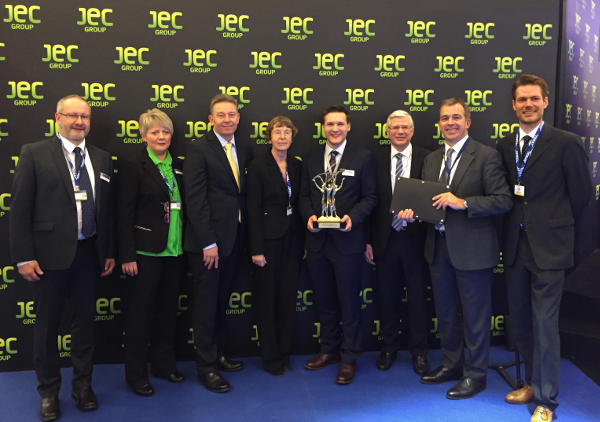
Winning the JEC Innovation Award 2016 for the FIMATEST System
Textechno awarded Best Apprenticing Company
In recent years two of Textechno’s apprentices have graduated with honours. Among these Mrs. Gina Cavallaro is now responsible for managing exports of Textechno’s international sales. For its excellence in education Textechno was awarded “Best Apprenticing Company” by the IHK (Industrie- und Handelskammer Mittlerer Niederrhein – Chamber of Industry and Commerce).
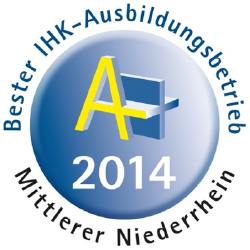
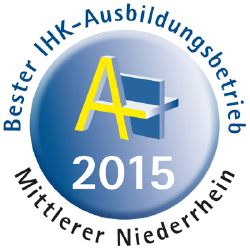
Textechno wins JEC Innovation Award in Singapore
Textechno has won the JEC Innovation Award for its DRAPETEST tester in the category “Test Control Machines”. The award ceremony took place at the JEC Asia in Singapore on June 26 2012. Present at the ceremony were Dr. Ulrich Mörschel (Textechno GmbH, 2nd from right), Dr. Andrea Miene (Faserinstitute Bremen, on the right) and Mr. Mirko Christ (Faserinstitute Bremen, 2nd from left).
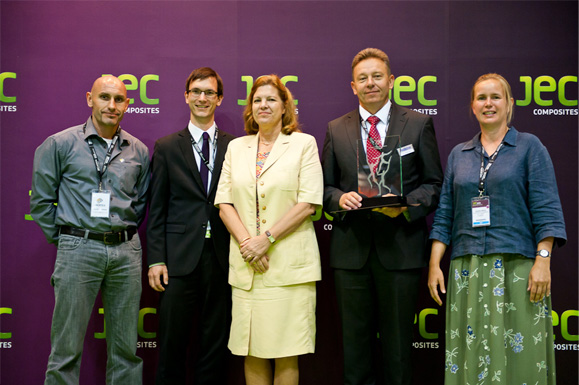
JEC Innovation Award Ceremony
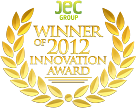
The DRAPETEST allows the measurement of draping effects like gaps, loops, folds, and fiber disorientation using an optical system. It was jointly developed with industry- and research partners within a public funded research project. Read more
FIBROTEST receives ITMF recognition
As the first testing instrument world-wide, the fibre length- and strength tester FIBROTEST from Textechno Herbert Stein GmbH & Co. KG, Germany received an official and full recognition from the International Committee on Cotton Testing Methods (ICCTM), a Committee of the International Textile Manufacturers Federation (ITMF; see itmf.org).
FIBROTEST has been developed to be used by spinners, but because of its flexibility in parameter settings is also interesting for research institutes. It determines fibre length distribution as well as strength in both, a direct measurement and relative to calibration cotton. In addition to cotton the instrument has been applied successfully for cottonized linen and it can be used for fibre length testing on all kinds of fibres up to a maximum length of about 200 mm. FIBROTEST has proven its reliability at remote customers all over the world.
New testing equipment for short fibres
IIBCC 2010, Aarlborg
Dr. Ulrich Mörschel, Erich Ingelsberger
Textechno Herbert Stein GmbH & Co. KG,
Mönchengladbach/Germany
Read more
Optimierte Garnauswahl in der Weberei durch Einsatz moderner Prüftechnik
Webereikolloquium Denkendorf 2008 Dr. U. Mörschel Textechno Herbert Stein GmbH & Co. KG, Mönchengladbach/Germany Read more
Automatic linear-density and tensile testing on carbon fibers
Automatic single-fiber linear-density and tensile tests on up to 500 individual carbon fibers are possible with the FAVIMAT-ROBOT 2 and FAVIMAT-AIROBOT 2 of Textechno. These carbon fiber testing techniques are described in this article.
Chemical Fibers International 4/2008 Dr. Ulrich Mörschel, Christine Faymonville, Erich Ingelsberger Textechno Herbert Stein GmbH & Co. KG, Mönchengladbach/Germany
Cotton Control
Textechno introduces new line of instruments for testing of cotton fibres and yarns. Read more
Automatic crimp measurement on staple fibres
Denkendorf Colloquium, 11/1999
Dr. U. Mörschel
Textechno Herbert Stein GmbH & Co. KG,
Mönchengladbach/Germany
ABSTRACT
This article describes the automated measurement of crimp parameters of up to 450 fibres with the Textechno FAVIMAT ROBOT.
Lenzing Instruments joins Textechno
Textechno Herbert Stein GmbH & Co. KG in Mönchengladbach (Germany) and LENZING TECHNIK GmbH & Co. KG in Lenzing (Austria) have signed a contract on September 1st, according to which Textechno takes over LENZING INSTRUMENTS , the former division of LENZING TECHNIK. Read more
New universal filament yarn tester
Chemical Fibers International 2003
Textechno Herbert Stein GmbH & Co. KG,
Mönchengladbach/Germany
ABSTRACT
Testing of a running yarn, also called dynamic or continuous yarn test, is known in various fields of the textile testing technology, e.g. in the form of yarn tension measurements or yarn evenness tests. Compared to tests on a discrete yarn length, testing on the running yarn has some advantages such as a high testing efficiency. This article describes the Textechno DYNAFIL ME and it’s application in the testing of filament yarns.


